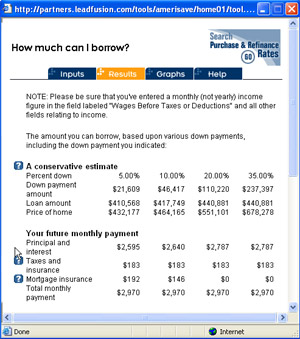How much home can you
afford?
Before you begin shopping
for a house, you should find
out the maximum amount you
can afford to pay. This is
usually limited by the sum
of two amounts: the cash
you can offer as a down
payment and amount you can
borrow.
How much can you borrow?
The first step is to shop
for a good lender. (Click
here for some excellent
tips from Jack Guttentag,
the Mortgage Professor, on
how to do this.) Guttentag
gives top scores to online
lenders
Amerisave and
E-Loan for "depth and
comprehensiveness of the
information provided," so
you may want to start with
them.
At either of these sites,
click "Calculators" on the
toolbar, then on "How Much
Can I Borrow?" (for
Amerisave) or the "Home
Affordability Calculator"
(for E-Loan) to get a rough
idea of what you can
borrow. In order to approve
a mortgage loan, of course,
a lender would need more
information about your
finances and an appraisal of
the property you plan to
buy.
 |
Many lender
websites have
calculators that
give you a rough
estimate of how
much you can
borrow.
|
How much should you borrow?
You'll probably be
pleasantly surprised at the
amount of money you'll be
able to borrow--loan
officers can stretch you to
the limit (and beyond) of
your ability to pay with
creative devices like
adjustable rate mortgages (ARMs),
graduated mortgages, and
interest-only loans. But
before you start house
hunting, you should think
carefully about how much you
should borrow.
Here's a
good resource for
thinking this through.
Be aware that mortgage loans
over $417,000 are called
jumbos and carry a higher
interest rate than those
under $417,000, which are
called conforming or
conventional loans. If
possible, try to keep your
borrowing below that
threshold.
See
if you can improve your
credit score
Your credit report gives the
lending industry's
assessment of how good a
credit risk you are. Since
this is one of the factors
that a lender considers
before approving a loan,
you'll want your score to be
as high as possible.
The government requires
credit reporting companies
to give you a free annual
credit report. Make sure
you go to
annualcreditreport.com
to get it. (This
government website
explains why you should
avoid all the imposter
websites that also offer
free credit reports.)
It's a good idea to check
your score early on, so
you'll have time to improve
it by fixing errors or
making changes in your
finances. This
CNN Money article offers
suggestions on how to
improve your score.
Next step: Shopping
for a neighborhood and home.
ŠLori Alden, 2008. All
rights reserved. |

